Dec 1, 2022 | Non categorizzato
The World Council of Churches (WCC) hosted Focolare president Margaret Karram and co-president Jesús Moran, as well as other members of the Focolare community, on 28 November, offering a guided tour of the Ecumenical Centre, and discussing unity, reconciliation, inter-religious bridge-building, Faith and Order, and communications, among other issues of interest. WCC acting general secretary Rev. Prof. Dr Ioan Sauca expressed appreciation for the many past collaborations between the WCC and the Focolare, most recently the Focolare’s participation at the WCC 11th Assembly in Karlsruhe. Sauca said the WCC recognizes the importance of cooperation and mutual support between the WCC and the Focolare to serve together under the new paradigm of the pilgrimage of justice, reconciliation, and unity. “Christians of different churches belonging to Focolare have been part of delegations of their respective churches and in other capacities at WCC assemblies,” noted Sauca, who summarized a long history of cooperation between the two groups. “Your commitment to promoting the dialogue between Christians, Jews, and Muslims as well as your engagement in a sustained dialogue between Israelis and Palestinians are inspiring assets for the worldwide movement of Focolare and beyond,” said Sauca. Staff from the WCC and representatives from the Focolare movement also discussed past and future areas of collaboration, and shared their experiences related to unity and ecumenism. Karram shared her warmest greetings and expressed great joy to be visiting the WCC, 20 years after the last visit of Focolare founder Chiara Lubich visited the WCC. “Twenty years ago, Chiara Lubich, founder of the Focolare movement, came here at the invitation of the then-general secretary Konrad Raiser and Prof. Ioan Sauca,” said Karram. “I am very grateful to be with you all here today to commemorate this anniversary. I give praise to God because I am aware I am walking on ground that I hold sacred.” Karram assumed the WCC of the willingness and of the ability of the Focolare movement to continue walking together. “I want to add not only walking together—but we have to hold hands—not only walk together but hold hands, side-by-side. I want to promise this.” Rev. Prof. Dr Jerry Pillay WCC general secretary-elect, commended the many ways in which the Focolare community and the WCC have exchanged ideas and insights over the years. “Our collaboration has been on different levels,” he said.
Source: WWC
Full speech by Margaret Karram Photo gallery on the Focolare leadership visit to the WCC https://www.youtube.com/watch?v=-Lx8IklNEPQ&t=53s https://www.youtube.com/watch?v=q7OMciDbHA8&t=1s
Nov 25, 2022 | Non categorizzato
This is one of the pages from the diary of Irene, a young editor of Teens, a magazine of the Città Nuova publishing group, which is made by teenagers for teenagers. Through her eyes and her words we learn of a journey in a country marked by divisions and we get to know the project “Harmony among peoples”, which, thanks to art and dance is spreading beauty and hope to the new generations in Bethlehem. https://www.youtube.com/watch?v=E6rF91sFMdo
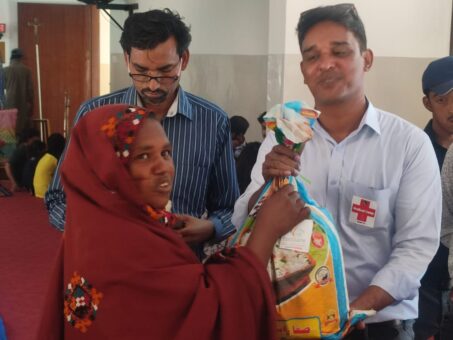
Nov 24, 2022 | Non categorizzato
In recent months, Pakistan has been hit by floods that have claimed many lives and destroyed much infrastructure. The Emergency Coordination of the Focolare Movement, through AMU (Action for a United World) and AFN (Action New Families), took immediate action to ensure initial assistance and basic needs were met. The floods’ destructive force caused extensive damage to communities in Pakistan affected, which began to be unleashed on this territory as early as mid-June 2022, bringing a third of the country to its knees.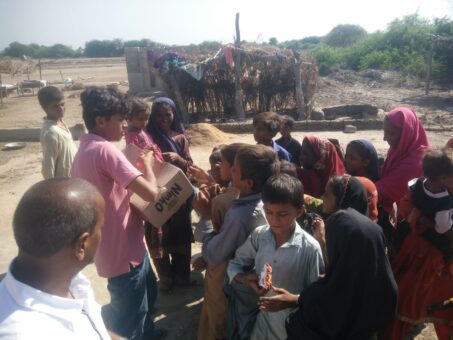 Many consequences still affect the population today. For this reason, the Emergency Coordination of the Focolare Movement, with AMU and AFN, upon learning of the emergency, launched a fundraiser to support the provision of food parcels, clothing and sanitary products to about 500 families in the localities of Nowshera in northern Pakistan; Tando-Alla-Yar and Kotri in Sindh; Sangar in southern Pakistan; and other localities still being assessed. Many have mobilised to respond to initial requests for help and to assess the most urgent needs on the ground. In the face of the ever-increasing number of displaced people, aid shipments were organised in the first few weeks and continue to this day. Despite precarious transportation, most of these families have already been reached. In addition, some members of the Focolare Movement on the ground are directly involved not only in the preparation and distribution of parcels, but also in providing medical care for those who need treatment and medicine to fight primarily typhoid, dengue, cholera and malaria. “On October 16, 2022, we went to a village in Haji Hafiz Shah Goth, about an hour’s drive from the city of Kotri, and set up a medical camp there,” says Fabian Clive, a member of the Focolare community in Karachi.
Many consequences still affect the population today. For this reason, the Emergency Coordination of the Focolare Movement, with AMU and AFN, upon learning of the emergency, launched a fundraiser to support the provision of food parcels, clothing and sanitary products to about 500 families in the localities of Nowshera in northern Pakistan; Tando-Alla-Yar and Kotri in Sindh; Sangar in southern Pakistan; and other localities still being assessed. Many have mobilised to respond to initial requests for help and to assess the most urgent needs on the ground. In the face of the ever-increasing number of displaced people, aid shipments were organised in the first few weeks and continue to this day. Despite precarious transportation, most of these families have already been reached. In addition, some members of the Focolare Movement on the ground are directly involved not only in the preparation and distribution of parcels, but also in providing medical care for those who need treatment and medicine to fight primarily typhoid, dengue, cholera and malaria. “On October 16, 2022, we went to a village in Haji Hafiz Shah Goth, about an hour’s drive from the city of Kotri, and set up a medical camp there,” says Fabian Clive, a member of the Focolare community in Karachi. “The doctors there examined 200 people including children, women and men. Most people do not have the opportunity to have regular medical check-ups, either because they are quite expensive or because they do not have access to the city. “Our goal is to set up medical camps in the different areas of Sindh that have not yet had this kind of assistance. There is a widespread call to responsibility and a great willingness to make a contribution.” The situation remains alarming even some weeks later. As water levels drop, the enormous severity of the devastation, compounded by malnutrition and disease, has emerged. The needs of the communities are increasing, changing every day. So carrying out response actions, continuing to embrace this country, is a shared goal. If you too would like to contribute to the Focolare Movement’s Emergency Coordination for Pakistan fundraiser, you can donate at the following:
“The doctors there examined 200 people including children, women and men. Most people do not have the opportunity to have regular medical check-ups, either because they are quite expensive or because they do not have access to the city. “Our goal is to set up medical camps in the different areas of Sindh that have not yet had this kind of assistance. There is a widespread call to responsibility and a great willingness to make a contribution.” The situation remains alarming even some weeks later. As water levels drop, the enormous severity of the devastation, compounded by malnutrition and disease, has emerged. The needs of the communities are increasing, changing every day. So carrying out response actions, continuing to embrace this country, is a shared goal. If you too would like to contribute to the Focolare Movement’s Emergency Coordination for Pakistan fundraiser, you can donate at the following:
Azione per un Mondo Unito ONLUS (AMU)
|
Azione per Famiglie Nuove ONLUS (AFN)
|
| IBAN: IT58S 05018 03200 000011204344 Banca Popolare Etica |
IBAN: IT92J 05018 03200 000016978561 Banca Popolare Etica |
| SWIFT code/BIC: ETICIT22XXX |
SWIFT code/BIC: ETICIT22XXX |
| Reference: Pakistan Emergency |
| Contributions for this made to the two current accounts will be handled jointly by AMU and AFN. Tax benefits are available for donations in many European Union countries and others around the world, in accordance with local regulations. Italian taxpayers will be able to obtain deductions and deductions from income according to the regulations governing non-profit organisations, up to 10% of income and to a limit of €70,000.00 annually, excluding donations made in cash. |
Maria Grazia Berretta
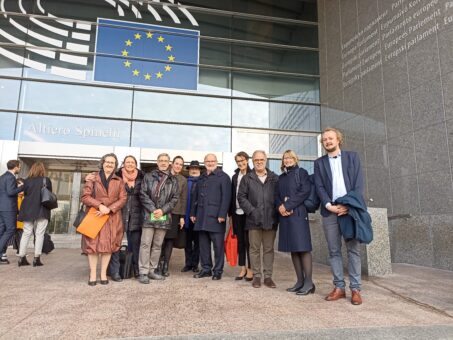
Nov 18, 2022 | Non categorizzato
Presentation to the European Parliament in Brussels (Belgium) of a document aimed at expressing a common social ethic, which contains the shared positions of Christians and Marxists. It is the result of an eight-year journey or we could even say one which has been going on for two centuries. “A project of transversal dialogue” is how Dialop defines itself. Christians and Marxists in Europe have been working on it for some years. After a meeting in the Vatican of some representatives of the European Left with Pope Francis, it took a decisive step forward (see Dialop: Christians and Marxists working together). 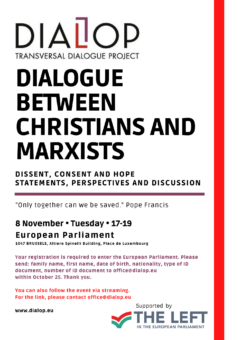 The event took place on 8th November in the Altiero Spinelli building with the presence of 40 people from 9 countries of the Union and others who followed the streaming. The presentation of the position paper, “In search of a common future in solidarity” was supported by the Left Group of the European Parliament, in collaboration with the Movement for Politics for Unity Movement and New Humanity, The document, on common positions in Socialist Christian dialogue, was written by Prof. Michael Brie, President of the Scientific Committee of the Rosa Luxemburg Foundation and by the Belgian sociologist, Prof. Bennie Callebaut of the Sophia University Institute. It analyses how, as antagonists in the past, Christianity and Marxism are faced with another wall to break down, that of wild capitalism and how they find surprising affinities in the present. In the message and in the person of Pope Francis they also find a figure who unites, a leader and a traveling companion. The paper states, “We are working on projects guided by shared visions in common struggles“. The document declines what these projects are, indicating some topics being explored: “an economy of life; a caring community; a policy of transformation in solidarity; a world in which there is room for many worlds; the dignity of every individual in a world rich in common goods; and together for peace”. The inevitable question of how, when it comes to discussion, these are expressed in practice, was formulated by Prof. Léonce Bekemans (Jean Monnet Chair, University of Padua). Walter Baier, from Transform!Europe, one of the initiators and coordinators of Dialop responded: “We work on three levels: dialogue as a cultural initiative in order to become a think tank; involving people in the work for solidarity, as happened with initiatives for migrants and refugees; arousing political involvement especially for building peace”. Marisa Matjas, Portuguese MEP of the Bloco de Esquerda, vice-president of the Party of the European Left in the European Parliament, was the hostess. She vividly remembered the words of Pope Francis to the members of the European Parliament in 2014, which were “said when we needed to hear them most”. “He spoke to us about keeping democracy alive in Europe, about employment and workers’ rights, about education, about migration, at a time when the EU was ignoring the massive movements of people coming from Syria; he also spoke about the dignity of human rights, we have many things in common that we need to work on together.”
The event took place on 8th November in the Altiero Spinelli building with the presence of 40 people from 9 countries of the Union and others who followed the streaming. The presentation of the position paper, “In search of a common future in solidarity” was supported by the Left Group of the European Parliament, in collaboration with the Movement for Politics for Unity Movement and New Humanity, The document, on common positions in Socialist Christian dialogue, was written by Prof. Michael Brie, President of the Scientific Committee of the Rosa Luxemburg Foundation and by the Belgian sociologist, Prof. Bennie Callebaut of the Sophia University Institute. It analyses how, as antagonists in the past, Christianity and Marxism are faced with another wall to break down, that of wild capitalism and how they find surprising affinities in the present. In the message and in the person of Pope Francis they also find a figure who unites, a leader and a traveling companion. The paper states, “We are working on projects guided by shared visions in common struggles“. The document declines what these projects are, indicating some topics being explored: “an economy of life; a caring community; a policy of transformation in solidarity; a world in which there is room for many worlds; the dignity of every individual in a world rich in common goods; and together for peace”. The inevitable question of how, when it comes to discussion, these are expressed in practice, was formulated by Prof. Léonce Bekemans (Jean Monnet Chair, University of Padua). Walter Baier, from Transform!Europe, one of the initiators and coordinators of Dialop responded: “We work on three levels: dialogue as a cultural initiative in order to become a think tank; involving people in the work for solidarity, as happened with initiatives for migrants and refugees; arousing political involvement especially for building peace”. Marisa Matjas, Portuguese MEP of the Bloco de Esquerda, vice-president of the Party of the European Left in the European Parliament, was the hostess. She vividly remembered the words of Pope Francis to the members of the European Parliament in 2014, which were “said when we needed to hear them most”. “He spoke to us about keeping democracy alive in Europe, about employment and workers’ rights, about education, about migration, at a time when the EU was ignoring the massive movements of people coming from Syria; he also spoke about the dignity of human rights, we have many things in common that we need to work on together.”  In his opening remarks on “Common paths towards a global, just and fraternal society”, the theologian Piero Coda said, “Today we need, like the food we live on, vision, spirit and covenant. It is time to hope and give hope ‘in the plural’. This is what Dialop invites us to do”. A plurality that requires wider alliances, not only the Catholic world, but the whole Christian world, with an ecumenical dimension; not only Christianity, but all religions; not only the left, but the various political ideologies that are committed to the common good and the defence of the environment. Citing the document, he said that there must be an initial effort to put aside any claim of “having the monopoly of the truth”. “Together with Marxists and Christians, a transformative and transversal social ethic must count on the contribution of other actors and traditions who are present in our continent and have different world views”, reiterated Fr Manuel Barrios Prieto, Secretary General of COMECE, recalling the concept of human fraternity, starting with the signing of the Abu Dhabi document of 2019 and the encyclical “All Brothers”. A renewed commitment to dialogue resumed in Brussels, with a momentum of inclusiveness, aware that dialogue is a ‘ work in permanent progress’.
In his opening remarks on “Common paths towards a global, just and fraternal society”, the theologian Piero Coda said, “Today we need, like the food we live on, vision, spirit and covenant. It is time to hope and give hope ‘in the plural’. This is what Dialop invites us to do”. A plurality that requires wider alliances, not only the Catholic world, but the whole Christian world, with an ecumenical dimension; not only Christianity, but all religions; not only the left, but the various political ideologies that are committed to the common good and the defence of the environment. Citing the document, he said that there must be an initial effort to put aside any claim of “having the monopoly of the truth”. “Together with Marxists and Christians, a transformative and transversal social ethic must count on the contribution of other actors and traditions who are present in our continent and have different world views”, reiterated Fr Manuel Barrios Prieto, Secretary General of COMECE, recalling the concept of human fraternity, starting with the signing of the Abu Dhabi document of 2019 and the encyclical “All Brothers”. A renewed commitment to dialogue resumed in Brussels, with a momentum of inclusiveness, aware that dialogue is a ‘ work in permanent progress’.
Maria Chiara De Lorenzo
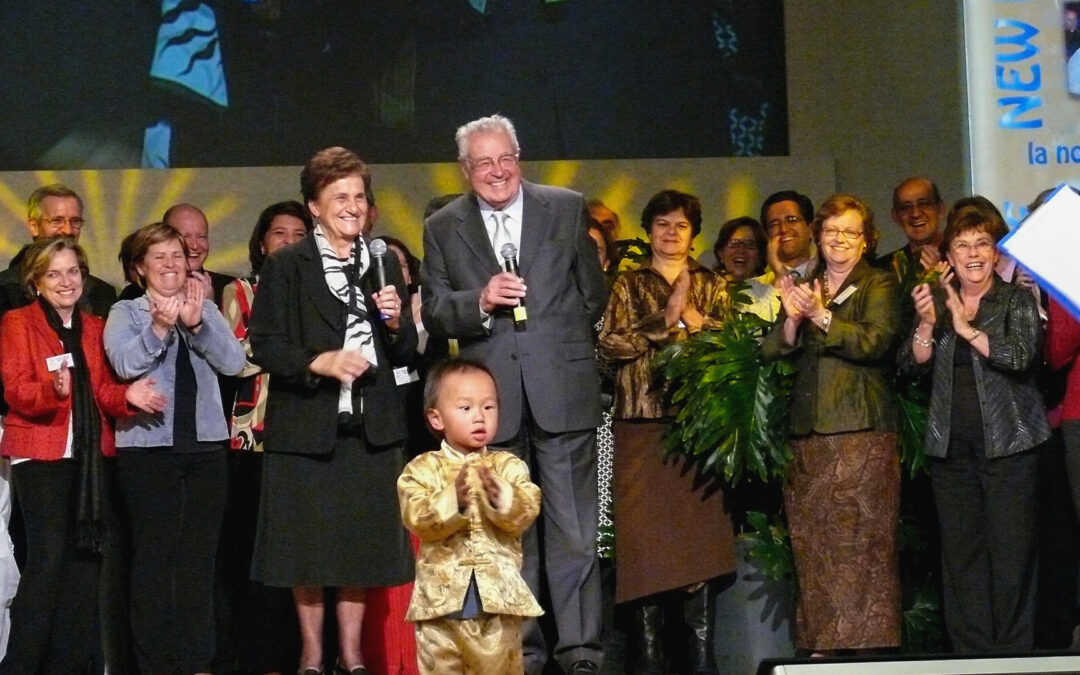
Nov 16, 2022 | Non categorizzato
One of the first married focolarini and co-founder of the New Families Movement, Danilo Zanzucchi died serenely on 16 November 2022 at the age of 102 in his home in Grottaferrata (Rome), surrounded by his wife Anna Maria, their five children (Chiaretta, Michele, Mariannita Giovanni and Francesco) and some of their 12 grandchildren. Danilo was the eldest son of a respected family from Parma (Italy). On his trips to Milan to work on the first constructions he designed, he met the charism of unity through Ginetta Calliari, one of Chiara Lubich’s first companions. He was already a fervent Catholic, involved in politics and the diocesan president of the Italian Catholic University Federation and subsequently of the Men of Catholic Action. 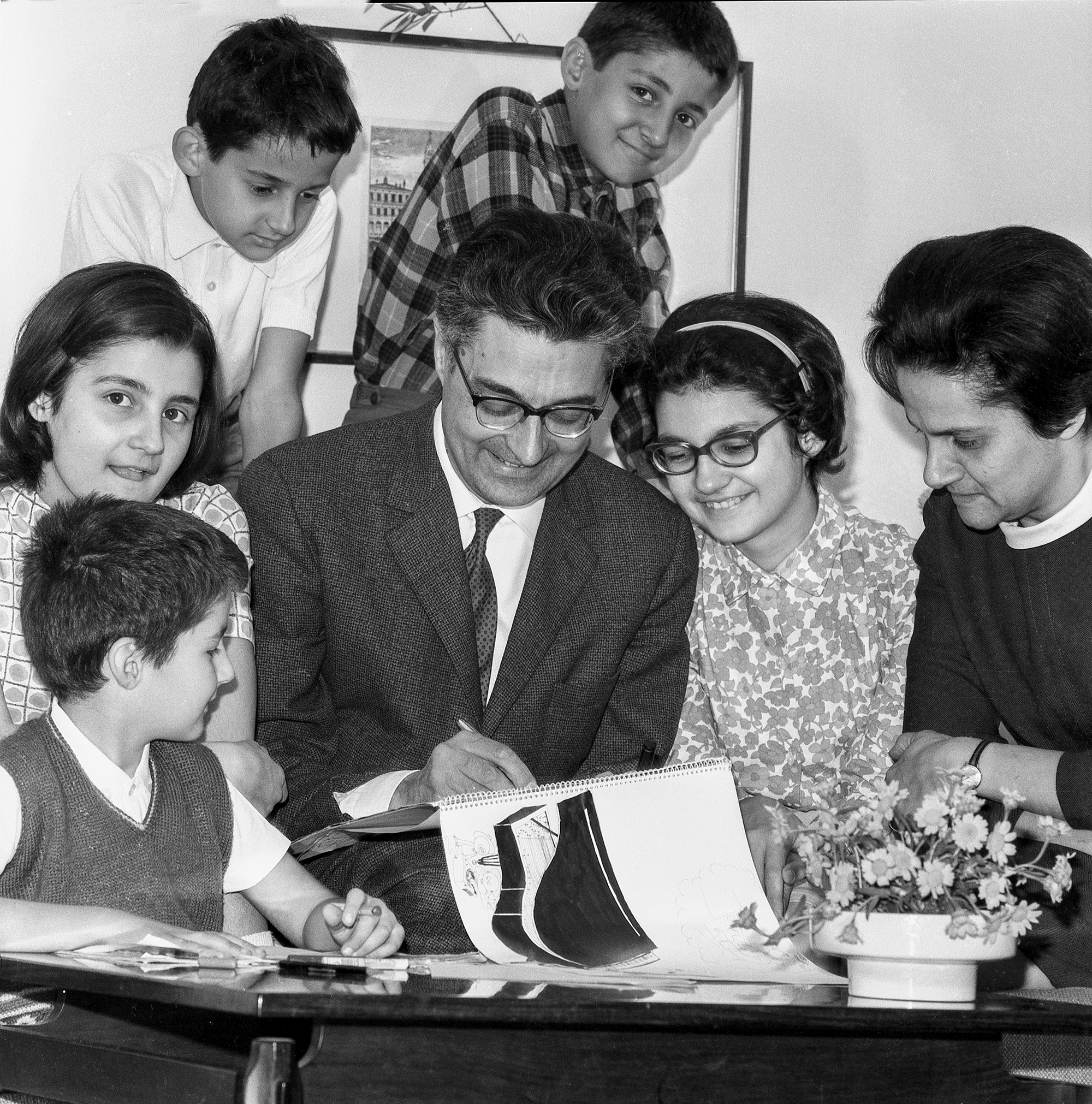 The impact with the charism led him to make an even greater commitment to God and to wish to base his life on living the Gospel. Anna Maria, his fiancée shared this choice. Around them the first community of Parma was born. They were greatly attracted by the innovative vocation of married focolarini pioneered by Igino Giordani. They decided to leave the promising career of an engineer and the privileges of a comfortable life to move with their then four children, as a family-focolare to Rome and devote themselves full time to the Focolare Movement. One of Danilo’s first assignments was the completion of the building in Rocca di Papa destined to become the Mariapolis Centre and, later, the international headquarters of the Movement. He then went to work for Città Nuova publishing house.
The impact with the charism led him to make an even greater commitment to God and to wish to base his life on living the Gospel. Anna Maria, his fiancée shared this choice. Around them the first community of Parma was born. They were greatly attracted by the innovative vocation of married focolarini pioneered by Igino Giordani. They decided to leave the promising career of an engineer and the privileges of a comfortable life to move with their then four children, as a family-focolare to Rome and devote themselves full time to the Focolare Movement. One of Danilo’s first assignments was the completion of the building in Rocca di Papa destined to become the Mariapolis Centre and, later, the international headquarters of the Movement. He then went to work for Città Nuova publishing house. 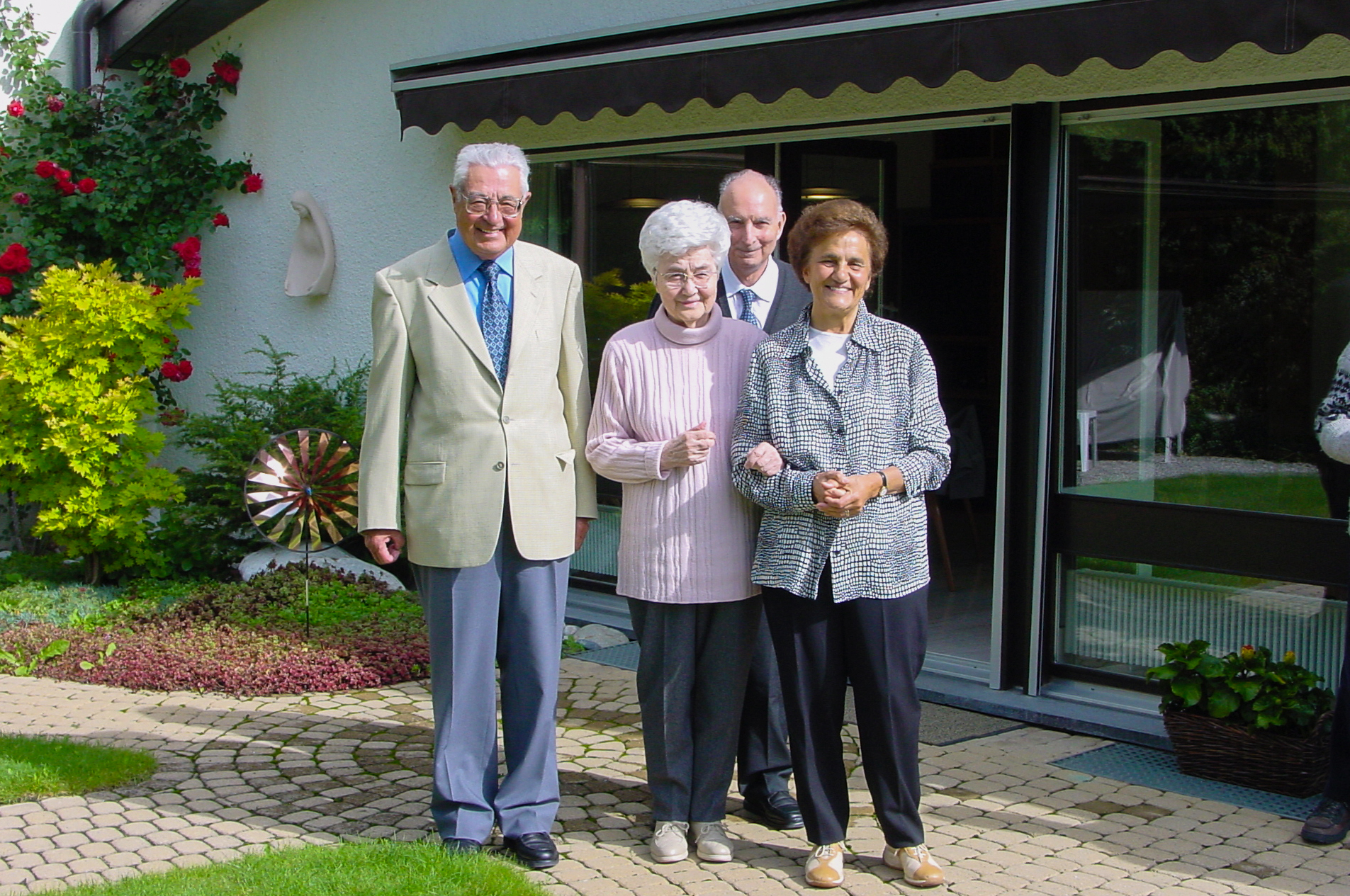 He worked closely with Chiara and played a major part in the formation of generations of married couples from different continents who, like him, wanted to follow in the footsteps of Giordani. In 1980, Anna Maria and he were invited as auditors to the Synod on the Family and in 1981 Chiara Lubich asked them to be part of the Central Council of the Movement, with the role of coordinators of New Families worldwide. In the 1980s, they also received a Papal appointment as consultors and, subsequently, as members of the Vatican Dicastery for the Family. Because of these responsibilities Danilo and Anna Maria met Pope Wojtyla several times. They also appeared on TV in Italy and in worldwide broadcasts to share their experience and their work at the service of the family. In the time of Benedict XVI, their collaboration with the Holy See increased to the point that he asked them to write the text for the Way of the Cross (2012) which took place at the Colosseum and over which he presided.
He worked closely with Chiara and played a major part in the formation of generations of married couples from different continents who, like him, wanted to follow in the footsteps of Giordani. In 1980, Anna Maria and he were invited as auditors to the Synod on the Family and in 1981 Chiara Lubich asked them to be part of the Central Council of the Movement, with the role of coordinators of New Families worldwide. In the 1980s, they also received a Papal appointment as consultors and, subsequently, as members of the Vatican Dicastery for the Family. Because of these responsibilities Danilo and Anna Maria met Pope Wojtyla several times. They also appeared on TV in Italy and in worldwide broadcasts to share their experience and their work at the service of the family. In the time of Benedict XVI, their collaboration with the Holy See increased to the point that he asked them to write the text for the Way of the Cross (2012) which took place at the Colosseum and over which he presided. 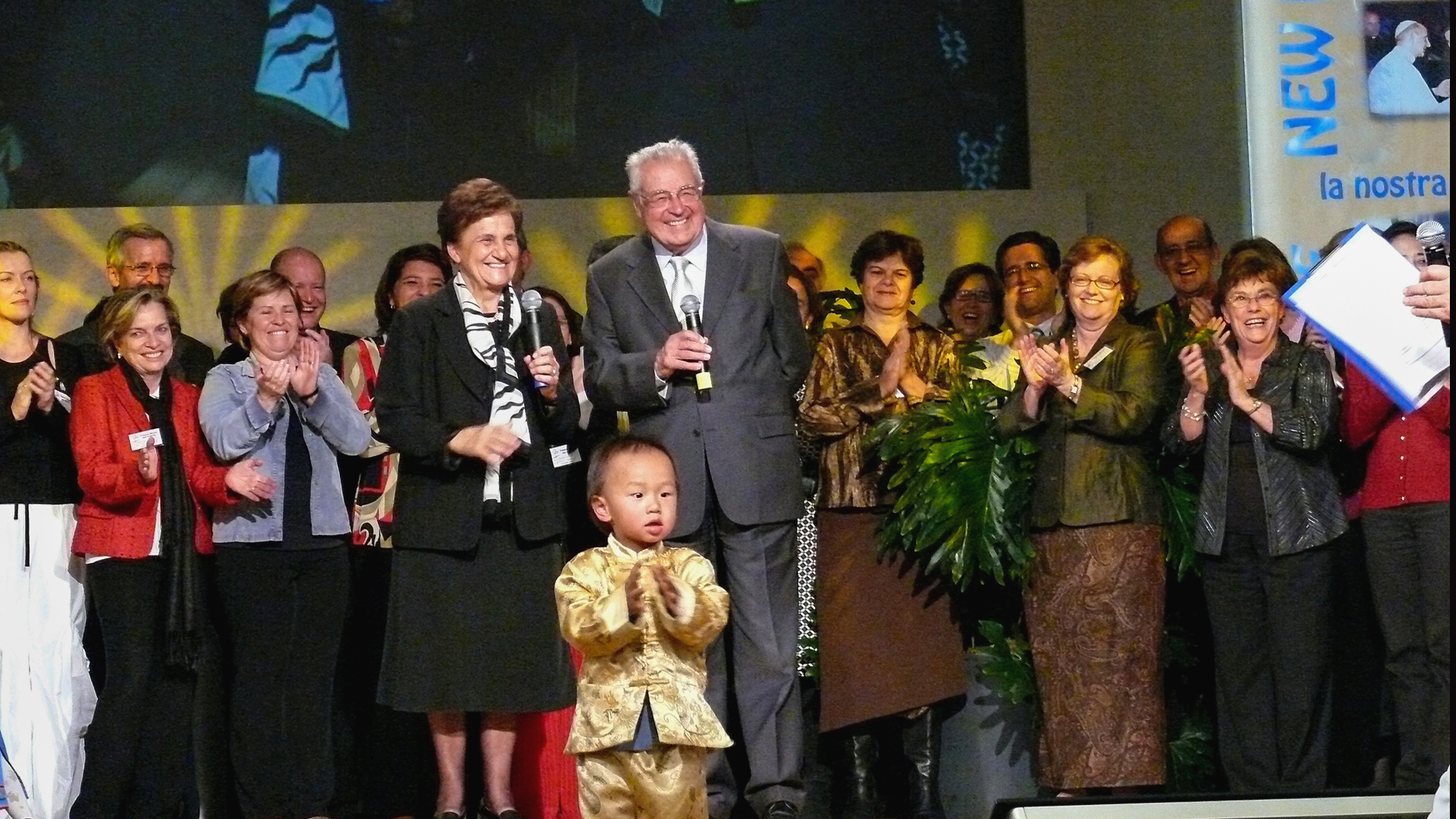 Danilo received many talents which he rendered abundantly fruitful. His long life is a hymn of glory to God stretched out in time. The entire Focolare Movement, in particular the host of married focolarini and the myriad of families from all over the world, for which he was an example, a confidant, a lovable and secure point of reference, are deeply grateful to him with a gratitude that pays homage to his humanity. He was a giant of righteousness, tenderness, simplicity and wisdom. Thank you Danilo for continuing to be that evangelical child which shone through your very being, your words, your exquisite humour, your paintings, the countless cartoons that you improvised (often on paper napkins) and which gave joy to all of us.
Danilo received many talents which he rendered abundantly fruitful. His long life is a hymn of glory to God stretched out in time. The entire Focolare Movement, in particular the host of married focolarini and the myriad of families from all over the world, for which he was an example, a confidant, a lovable and secure point of reference, are deeply grateful to him with a gratitude that pays homage to his humanity. He was a giant of righteousness, tenderness, simplicity and wisdom. Thank you Danilo for continuing to be that evangelical child which shone through your very being, your words, your exquisite humour, your paintings, the countless cartoons that you improvised (often on paper napkins) and which gave joy to all of us.
Anna and Alberto Friso
https://youtu.be/dKwiuQ7cAeI
Nov 16, 2022 | Non categorizzato
A look at the world with the aim of spreading “good news”. This is what animates the Teens International editorial offices scattered in various parts of the world and supported by the Città Nuova publishing group. A space created by teenagers for teenagers, where they can exchange opinions and ideas; they can be trained in the production of contents for various media and can find together communication models that are guided by true values. https://www.youtube.com/watch?v=__Gj7BG4Nu4&list=PL9YsVtizqrYsxCVExqFc_vvuzCKyNbr43


 Many consequences still affect the population today. For this reason, the Emergency Coordination of the Focolare Movement, with AMU and AFN, upon learning of the emergency, launched a fundraiser to support the provision of food parcels, clothing and sanitary products to about 500 families in the localities of Nowshera in northern Pakistan; Tando-Alla-Yar and Kotri in Sindh; Sangar in southern Pakistan; and other localities still being assessed. Many have mobilised to respond to initial requests for help and to assess the most urgent needs on the ground. In the face of the ever-increasing number of displaced people, aid shipments were organised in the first few weeks and continue to this day. Despite precarious transportation, most of these families have already been reached. In addition, some members of the Focolare Movement on the ground are directly involved not only in the preparation and distribution of parcels, but also in providing medical care for those who need treatment and medicine to fight primarily typhoid, dengue, cholera and malaria. “On October 16, 2022, we went to a village in Haji Hafiz Shah Goth, about an hour’s drive from the city of Kotri, and set up a medical camp there,” says Fabian Clive, a member of the Focolare community in Karachi.
Many consequences still affect the population today. For this reason, the Emergency Coordination of the Focolare Movement, with AMU and AFN, upon learning of the emergency, launched a fundraiser to support the provision of food parcels, clothing and sanitary products to about 500 families in the localities of Nowshera in northern Pakistan; Tando-Alla-Yar and Kotri in Sindh; Sangar in southern Pakistan; and other localities still being assessed. Many have mobilised to respond to initial requests for help and to assess the most urgent needs on the ground. In the face of the ever-increasing number of displaced people, aid shipments were organised in the first few weeks and continue to this day. Despite precarious transportation, most of these families have already been reached. In addition, some members of the Focolare Movement on the ground are directly involved not only in the preparation and distribution of parcels, but also in providing medical care for those who need treatment and medicine to fight primarily typhoid, dengue, cholera and malaria. “On October 16, 2022, we went to a village in Haji Hafiz Shah Goth, about an hour’s drive from the city of Kotri, and set up a medical camp there,” says Fabian Clive, a member of the Focolare community in Karachi.
 The event took place on 8th November in the Altiero Spinelli building with the presence of 40 people from 9 countries of the Union and others who followed the streaming. The presentation of the position paper, “In search of a common future in solidarity” was supported by the Left Group of the European Parliament, in collaboration with the Movement for Politics for Unity Movement and New Humanity, The document, on common positions in Socialist Christian dialogue, was written by Prof. Michael Brie, President of the Scientific Committee of the Rosa Luxemburg Foundation and by the Belgian sociologist, Prof. Bennie Callebaut of the Sophia University Institute. It analyses how, as antagonists in the past, Christianity and Marxism are faced with another wall to break down, that of wild capitalism and how they find surprising affinities in the present. In the message and in the person of Pope Francis they also find a figure who unites, a leader and a traveling companion. The paper states, “We are working on projects guided by shared visions in common struggles“. The document declines what these projects are, indicating some topics being explored: “an economy of life; a caring community; a policy of transformation in solidarity; a world in which there is room for many worlds; the dignity of every individual in a world rich in common goods; and together for peace”. The inevitable question of how, when it comes to discussion, these are expressed in practice, was formulated by Prof. Léonce Bekemans (Jean Monnet Chair, University of Padua). Walter Baier, from Transform!Europe, one of the initiators and coordinators of Dialop responded: “We work on three levels: dialogue as a cultural initiative in order to become a think tank; involving people in the work for solidarity, as happened with initiatives for migrants and refugees; arousing political involvement especially for building peace”. Marisa Matjas, Portuguese MEP of the Bloco de Esquerda, vice-president of the Party of the European Left in the European Parliament, was the hostess. She vividly remembered the words of Pope Francis to the members of the European Parliament in 2014, which were “said when we needed to hear them most”. “He spoke to us about keeping democracy alive in Europe, about employment and workers’ rights, about education, about migration, at a time when the EU was ignoring the massive movements of people coming from Syria; he also spoke about the dignity of human rights, we have many things in common that we need to work on together.”
The event took place on 8th November in the Altiero Spinelli building with the presence of 40 people from 9 countries of the Union and others who followed the streaming. The presentation of the position paper, “In search of a common future in solidarity” was supported by the Left Group of the European Parliament, in collaboration with the Movement for Politics for Unity Movement and New Humanity, The document, on common positions in Socialist Christian dialogue, was written by Prof. Michael Brie, President of the Scientific Committee of the Rosa Luxemburg Foundation and by the Belgian sociologist, Prof. Bennie Callebaut of the Sophia University Institute. It analyses how, as antagonists in the past, Christianity and Marxism are faced with another wall to break down, that of wild capitalism and how they find surprising affinities in the present. In the message and in the person of Pope Francis they also find a figure who unites, a leader and a traveling companion. The paper states, “We are working on projects guided by shared visions in common struggles“. The document declines what these projects are, indicating some topics being explored: “an economy of life; a caring community; a policy of transformation in solidarity; a world in which there is room for many worlds; the dignity of every individual in a world rich in common goods; and together for peace”. The inevitable question of how, when it comes to discussion, these are expressed in practice, was formulated by Prof. Léonce Bekemans (Jean Monnet Chair, University of Padua). Walter Baier, from Transform!Europe, one of the initiators and coordinators of Dialop responded: “We work on three levels: dialogue as a cultural initiative in order to become a think tank; involving people in the work for solidarity, as happened with initiatives for migrants and refugees; arousing political involvement especially for building peace”. Marisa Matjas, Portuguese MEP of the Bloco de Esquerda, vice-president of the Party of the European Left in the European Parliament, was the hostess. She vividly remembered the words of Pope Francis to the members of the European Parliament in 2014, which were “said when we needed to hear them most”. “He spoke to us about keeping democracy alive in Europe, about employment and workers’ rights, about education, about migration, at a time when the EU was ignoring the massive movements of people coming from Syria; he also spoke about the dignity of human rights, we have many things in common that we need to work on together.” 
 The impact with the charism led him to make an even greater commitment to God and to wish to base his life on living the Gospel. Anna Maria, his fiancée shared this choice. Around them the first community of Parma was born. They were greatly attracted by the innovative vocation of married focolarini pioneered by Igino Giordani. They decided to leave the promising career of an engineer and the privileges of a comfortable life to move with their then four children, as a family-focolare to Rome and devote themselves full time to the Focolare Movement. One of Danilo’s first assignments was the completion of the building in Rocca di Papa destined to become the Mariapolis Centre and, later, the international headquarters of the Movement. He then went to work for Città Nuova publishing house.
The impact with the charism led him to make an even greater commitment to God and to wish to base his life on living the Gospel. Anna Maria, his fiancée shared this choice. Around them the first community of Parma was born. They were greatly attracted by the innovative vocation of married focolarini pioneered by Igino Giordani. They decided to leave the promising career of an engineer and the privileges of a comfortable life to move with their then four children, as a family-focolare to Rome and devote themselves full time to the Focolare Movement. One of Danilo’s first assignments was the completion of the building in Rocca di Papa destined to become the Mariapolis Centre and, later, the international headquarters of the Movement. He then went to work for Città Nuova publishing house.  He worked closely with Chiara and played a major part in the formation of generations of married couples from different continents who, like him, wanted to follow in the footsteps of Giordani. In 1980, Anna Maria and he were invited as auditors to the Synod on the Family and in 1981 Chiara Lubich asked them to be part of the Central Council of the Movement, with the role of coordinators of
He worked closely with Chiara and played a major part in the formation of generations of married couples from different continents who, like him, wanted to follow in the footsteps of Giordani. In 1980, Anna Maria and he were invited as auditors to the Synod on the Family and in 1981 Chiara Lubich asked them to be part of the Central Council of the Movement, with the role of coordinators of  Danilo received many talents which he rendered abundantly fruitful. His long life is a hymn of glory to God stretched out in time. The entire Focolare Movement, in particular the host of married focolarini and the myriad of families from all over the world, for which he was an example, a confidant, a lovable and secure point of reference, are deeply grateful to him with a gratitude that pays homage to his humanity. He was a giant of righteousness, tenderness, simplicity and wisdom. Thank you Danilo for continuing to be that evangelical child which shone through your very being, your words, your exquisite humour, your paintings, the countless cartoons that you improvised (often on paper napkins) and which gave joy to all of us.
Danilo received many talents which he rendered abundantly fruitful. His long life is a hymn of glory to God stretched out in time. The entire Focolare Movement, in particular the host of married focolarini and the myriad of families from all over the world, for which he was an example, a confidant, a lovable and secure point of reference, are deeply grateful to him with a gratitude that pays homage to his humanity. He was a giant of righteousness, tenderness, simplicity and wisdom. Thank you Danilo for continuing to be that evangelical child which shone through your very being, your words, your exquisite humour, your paintings, the countless cartoons that you improvised (often on paper napkins) and which gave joy to all of us.